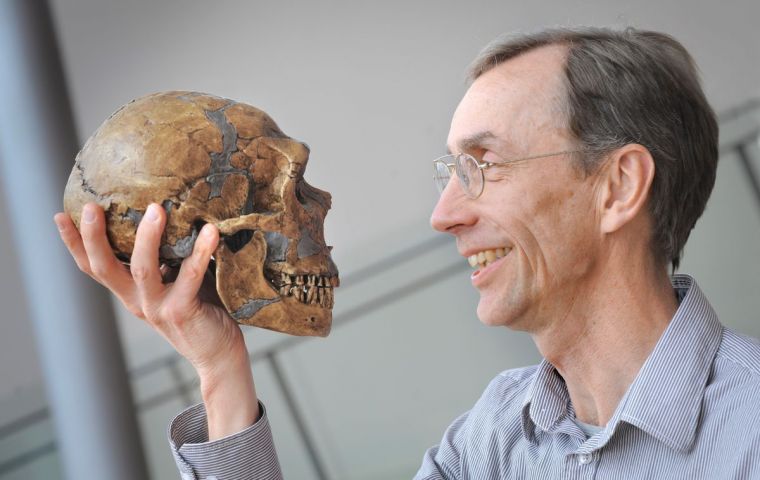MercoPress. South Atlantic News Agency
Sweden-born scientist gets Medicine Nobel Prize 40 years after his father did
 Pääbo's father, Sune Bergström, had already received the Medicine Nobel Prize in 1982 for his findings on hormones. Monday's winner bears the family name of Estonian chemist mother Karin
Pääbo's father, Sune Bergström, had already received the Medicine Nobel Prize in 1982 for his findings on hormones. Monday's winner bears the family name of Estonian chemist mother Karin A Sweden-born scientist who resides in Leipzig, Germany, has been awarded Monday the 2022 Medicine Nobel Prize for his findings on prehistoric DNA.
Svante Pääbo, currently aged 67, discovered in 2009 that 2% of genes had passed from these now extinct hominins to Homo sapiens. Pääbo, a native of Stockholm, received the 2018 Princess of Asturias Award for Technical and Scientific Research in Spain. His father, Sune Bergström, already received the Medicine Nobel Prize in 1982 for his findings on hormones. Svante Pääbo bears the family name of his mother, Estonian chemist Karin Pääbo.
The complete sequencing of the Neanderthal genome and the foundation of this discipline that analyzes DNA from ancient times to decipher human genes showed that the ancient gene flow to present-day man has a physiological impact, for example, on the way the immune system reacts to infections.
Pääbo is currently serving as the director of the Max Planck Institute for Evolutionary Anthropology.
“By revealing the genetic differences that distinguish all living humans from extinct hominids, his discoveries have provided the basis for the exploration of what makes us, humans, unique,” the jury said.
Thanks to the sequencing of a bone found in Siberia in 2008, Pääbo was able to reveal the existence of a different and previously unknown hominin, the Denisova man, who lived in present-day Russia and Asia.
Their work had recently shown that Covid-19 sufferers with a segment of Neanderthal DNA - mostly in Europe and South Asia - inherited from a crossover with the human genome some 60,000 years ago, are more at risk of severe complications of the disease. “The genetic differences between Homo sapiens and our closest missing relatives were not known until they were identified thanks to Pääbo's work,” the Nobel committee added in its decision.
The Swedish researcher succeeded in overcoming the difficulties of studying DNA that has deteriorated over time, since after thousands of years, only highly contaminated remnants were available. Pääbo's “big contribution” was to have devised “chemical tricks to be able to analyze ancient DNA,” a committee member explained.
Neanderthal man cohabited for a time with the modern-age man in Europe before disappearing completely some 30,000 years ago.
The awards are expected to go on till 10 October, when the highly anticipated Peace Prize will be announced.
He is also attributed with discovering the previously unknown subspecies of archaic humans called Denisova hominin. Pääbo also discovered that there had been a gene transfer from the Denisova hominins to Homo sapiens, which points to the two subspecies procreating at some point while they coexisted.
This discovery has significant relevance in shaping our knowledge of the difference in the physiology of present-day humans, especially when it comes to different immunities. “As we learn more and more about genomes from different parts of the world, it's important to have these reference points that tell us about our history...in terms of knowing more about our evolution, and of course medical implications.”
Among the big losers in Monday's announcement was Hungarian biochemist Katalin Kariko, known for her groundbreaking research that led to the development of the first mRNA vaccines to fight COVID-19, made by Pfizer and Moderna.




Top Comments
Disclaimer & comment rulesCommenting for this story is now closed.
If you have a Facebook account, become a fan and comment on our Facebook Page!